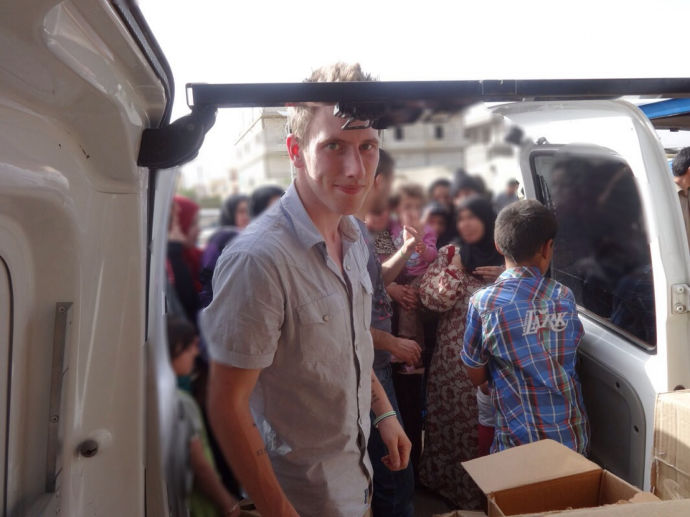
In 2007, Peter Kassig, a nineteen-year-old from Indianapolis, Indiana, left the Army and embarked on a period of deep searching. His deployment to Iraq, as a member of an élite Ranger battalion, earlier that year, had been cut short for medical reasons, but it had left a lasting impression: he knew that waging war was not for him.
Kassig returned to Indiana, where, in the course of the next five years, he tried college and marriage, but neither took. During a break from classes in the spring of 2012, he travelled to Lebanon, and, as the crisis in Syria swelled, he decided to stay in the region. On October 1, 2013, Kassig was captured by Syrian militants, and he has been held by them since. Islamic State, also known as ISIS, which has been steadily executing Western hostages, now says that he will be the next to be killed.
Kassig was one of many itinerant idealists in Beirut, Syrian and foreign alike, who were drawn to the uprising: students gave up their classes to stand in front of tanks, doctors left lucrative practices to treat patients on the front lines, Western journalists wanted to share the war with the world. What set Kassig apart from many of them was his intense drive and restless engagement with his surroundings. While friends drank beer at bars on Gemmayze Street, Kassig grabbed camping gear and set out for the mountains. He visited the Palestinian refugee camps that dot the landscape around Beirut, thinking about ways to bring solar power and other utilities into those neglected communities. Later, as the war in Syria encroached on Lebanon’s borders, sending desperate and wounded civilians into rural communities in the north, Kassig travelled to Tripoli to volunteer his services at a clinic, suturing wounds and comforting the dying. (He had received medical training in the Army and had studied to be an E.M.T. in Indiana.)
The crisis in Syria seemed to offer an opening for ambitious do-gooders like Kassig; at least, they were lured by the prospect of one. With much of the country closed off to international agencies, and the United Nations barred from operating inside the country without permission from Damascus, the humanitarian response largely fell to private donors and personal campaigns. (Alan Henning, a taxi-driver who was killed by Islamic State militants, had been using his savings and vacation time to bring aid into Syria when he was taken captive.) When I first met Kassig, in the summer of 2013, he had recently founded Special Emergency Response and Assistance, an organization that delivered medical supplies to Syria. Kassig’s small team, with bases of operations in Beirut and southern Turkey, was making trips into the country’s most dangerous war zones.
Kassig’s involvement in the Syrian conflict was consuming, and it pulled him from the margins of the war into its depths, at a time when increasing instability caused many people to take a step back. Last September, not long before his final trip into Syria, Kassig and I met at a café near downtown Beirut. We were outside, enjoying the warm end-of-summer air. It was late. In Syria, Kassig told me, he had recently encountered new levels of danger and unpredictability, and he acknowledged that the perils of travelling there were mounting. A few weeks earlier, an American journalist, Steven Sotloff, had disappeared after entering the country by way of Turkey. (Sotloff was beheaded by ISIS soldiers this September.) Most news outlets had stopped letting their employees visit the country at all.
Kassig recognized these hazards, and he didn’t try to convince me that going back was safe, or even wise. But his commitment to the relief project he had embarked on was untempered, and it was clear to me that he would soon go back. Earlier that year, in an interview with Time, he had said, “The truth is sometimes I really think I would like to do something else, but at the end of the day this work is really the only thing that I have found that gives my life both meaning and direction.”
Kassig’s compulsion to return to Syria was complex—a combination of genuine bravery and altruism and his own, more personal impulses. “We each get one life and that’s it,” he told CNN in the summer of 2012. “We get one shot at this, and we don’t get any do-overs, and, for me, it was time to put up or shut up. The way I saw it, I didn’t have a choice. This is what I was put here to do. I guess I am just a hopeless romantic, and I am an idealist, and I believe in hopeless causes.”
At some point in the past year, Kassig converted to Islam, a process that his parents believe started before his captivity. He has assumed the name Abdul-Rahman. “I am obviously pretty scared to die but the hardest part is not knowing, wondering, hoping, and wondering if I should even hope at all,” he wrote in a letter to his parents, last June. “If I do die, I figure that at least you and I can seek refuge and comfort in knowing that I went out as a result of trying to alleviate suffering and helping those in need.”